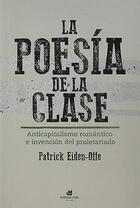
The first industrialisation was not only accompanied by mass misery, it also changed the way in which the lower classes narrated the difficulties of their present and their modes of resistance.
Before it was possible to speak of the proletariat and, therefore, when there were still no words to name the common experience of helplessness, countless texts, reports, socio-statistical studies, bulletins and novels emerged and circulated, which were later scorned as reactionary, anarchic and romantic. Their crime was to draw on a partly idealised past to attack a present of death and destruction.
This revolutionary literary and historical research is a journey to a time when people subjected to the new capitalism launched a poetry of the class with which to confront the prose of the situation, as well as a late rehabilitation of romantic anti-capitalism.






